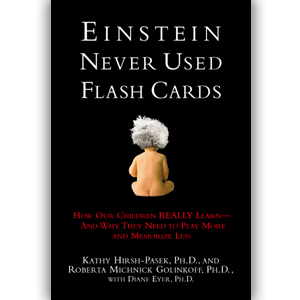
Einstein Never Used Flashcards – Reflect, Resist, and Re-center
 “The next time you read a sensational headline in a parenting magazine or hear about the latest research on child development at a meeting or on a talk show, stop yourself from frantically grabbing a pencil and scribbling notes about what you need to do differently, go out and buy, or work into your busy schedule,” the authors of Einstein Never Used Flashcards suggest. Instead, Hirsh-Pasek and Golinkoff recommend you take a moment to reflect, resist, and re-center because “playful environments and spontaneous learning opportunities hold the keys for a happy, emotionally healthy, and intelligent child – and for a fulfilled parent.”
“The next time you read a sensational headline in a parenting magazine or hear about the latest research on child development at a meeting or on a talk show, stop yourself from frantically grabbing a pencil and scribbling notes about what you need to do differently, go out and buy, or work into your busy schedule,” the authors of Einstein Never Used Flashcards suggest. Instead, Hirsh-Pasek and Golinkoff recommend you take a moment to reflect, resist, and re-center because “playful environments and spontaneous learning opportunities hold the keys for a happy, emotionally healthy, and intelligent child – and for a fulfilled parent.”
Why is it important to move from memorizing to learning in context? It boils down to the fact that we truly learn something new when we experience it. It was psychiatrist, William Glasser, who first reported this brain-based research: “We learn 10% of what we read, 20% of what we hear, 30% of what we see, 50% of what we see and hear, 70% of what we discuss, 80% of what we experience, and 95% of what we teach others.” Einstein Never Used Flashcards essentially illustrates how flash cards are useless tools for toddlers and preschoolers who cannot connect the information to anything meaningful in their world. Hirsh-Pasek and Golinkoff share examples of toddler “geniuses,” who have simply memorized words not actually learned to read, as their proud parents boast, for when presented with new words they are unable to pronounce them as real readers would. The authors of Einstein Never Used Flashcards set out to show parents that their “job” is to make learning fun and engaging so when students encounter formal instruction at school they’ll be ready for the information.
According to Hirsh-Pasek and Golinkoff, “The key to intelligence is how you learn, how you adapt knowledge, and how you process what is going on around you. Yet there is tremendous pressure today to look more at what children know rather than at how they know and learn it.” Why is this problematic? Because “being able to do a limited task is not the same thing as being able to use your knowledge intellectually,” Hirsh-Pasek and Golinkoff argue. Furthermore, “Overemphasizing the development of what’s between the ears can wind up deemphasizing the development of what needs to be in the heart in order to foster happy, confident children.” Hirsh-Pasek and Golinkoff also make a point of noting that in the day-to-day world no intelligence is more important than interpersonal, which is the ability to get along with others.
Therefore, parents need to let go of the myth that they are all-powerful in shaping their children’s intelligence and concentrate instead on joining in the fun. According to Hirsh-Pasek and Golinkoff, “Play promotes development – and in a number of domains. For instance, play promotes problem solving and creativity. It also helps to build better attention spans and encourages social development.” When parents follow their children’s lead, it can increase the play’s impact, as they’ll be benefitting from hearing your creative ideas, and it can give children a sense of power.
But play is only effective if parents resist the temptation to control it. Kids need to independently navigate the choices play offers them for it to provide the most essential intellectual and social advantages, Hirsh-Pasek and Golinkoff explain. So while the authors recognize that you might not always feel like you’re in control, you need to recognize that you are and your children need their turn. Hirsh-Pasek and Golinkoff maintain play gives children not only this opportunity but also the break they need “- to assimilate things they’ve learned, to master new skills, to work through scary emotional experiences, and just to have fun.” The authors realize that organized activities have their place in children’s lives, but they urge parents not to mistake them for play. “It is play, plain and simple, that affords many of the most essential intellectual and social advantages for children.”
With the myth that free play is a waste of time becoming popular in recent decades, play is more important than ever. According to Hirsh-Pasek and Golinkoff, “In the 21st century, creative problem solvers, independent thinkers, and people with expert social acumen will inevitably surpass those who have simply learned to be efficient at getting the right answers.” Thanks to modern technology, facts are available at our fingertips, the authors remind us. “Although the new movement in education called high-stakes testing functions as if right answers were what matters, the truly creative – the individuals who make the most significant contributions – go beyond finding answers to already formulated problems.”
So if knowing that Albert Einstein never used flash cards isn’t enough to convince you to just play with your kids, then pick up this great read to find out more about how children really learn. It’ll help you create an environment that fosters the kind of love of learning you really want.
Follow @WinterhalterV on Twitter for updates on blog posts or like Parenting by the Book on Facebook.
Read my other blog Befriending Forty.






